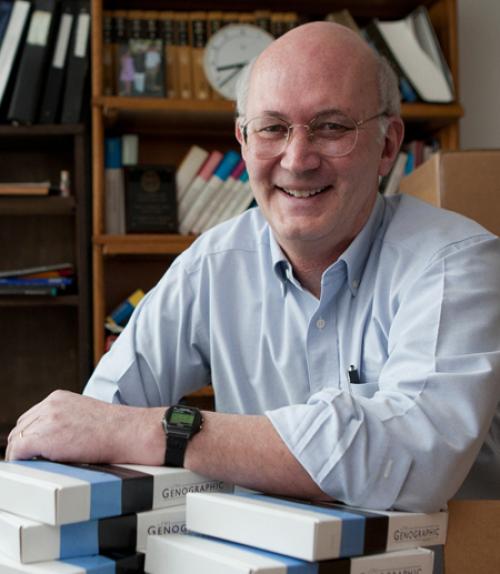Cornell professors Charles “Chip” Aquadro, Laura Harrington and Sean Nicholson are recipients of this year’s Stephen H. Weiss Presidential Fellowship, in recognition of outstanding teaching and mentoring of undergraduate students, President Elizabeth Garrett announced Jan. 29 at the Cornell Board of Trustees meeting in New York.
“Chip, Laura and Sean are superb, committed educators who inspire our undergraduates inside and outside the classroom,” Garrett said. “They exemplify our exceptional faculty, who are the foundation of our teaching, research and public engagement mission.”
Garrett also announced that the Weiss fellowship program will expand with two new teaching awards: the Stephen H. Weiss Junior Fellowship, honoring junior faculty members, and the Stephen H. Weiss Provost’s Teaching Fellowship, recognizing non-tenure-track faculty. The first winners of those new awards will be announced next year.
“We are grateful for the enduring commitment to excellence in teaching by Suzanne Weiss and the entire Weiss family,” Garrett said. “Supporting the expansion of this program is a testament to their belief in the educators at Cornell, all of whom strive to provide the most challenging and rewarding experience for our undergraduates.”
The original Weiss fellowship, established in 1992 by the late board of trustees Chairman Emeritus Stephen H. Weiss ’57, is a universitywide award given to a tenured faculty member who, in addition to a respected scholarly career, has a sustained record of effective, inspiring and distinguished teaching of undergraduates and of contributions to undergraduate education. Fellows receive a $5,000-per-year award for five years, provided they continue to hold a professorial appointment at Cornell. The award can be used for any university-related purpose.
Aquadro, the Charles A. Alexander Professor of Biological Sciences in the College of Arts and Sciences, joined the faculty in 1985. Also director of the Cornell Center for Comparative and Population Genomics, Aquadro has taught in the areas of population genetics and in personal genomics and medicine. A fellow faculty member said in a letter supporting Aquadro’s nomination, “It is not an exaggeration to say that he has trained … a substantial portion of the practicing population genetics faculty in the U.S.”
A recipient of the college’s Russell Distinguished Teaching Award, Aquadro has also been a valued mentor to many students. According to one former student, Aquadro “always made time for me and constantly challenged me to push myself to think outside the box for real-world applications of classroom knowledge.” And another alumnus credited Aquadro for helping him land at the University of Chicago for his Ph.D. program, noting that he has “made connections in Chicago with other students who had been similarly influenced by Chip and have only had praise to give.”
Harrington, professor and chair of the Department of Entomology in the College of Agriculture and Life Sciences, is in her 15th year at Cornell. Much of what she teaches is a product of the world-class research program she directs, as well as interactions with other leaders in the field.
Harrington’s specialty, the biology of mosquitoes that transmit human pathogens, puts her on the front lines in the fight against deadly diseases including malaria, yellow and dengue fever, and encephalitis. She brings that expertise to her popular 200-level course, Plagues and People, a class that one student said “transformed my experience at Cornell, molded my views of science, and inspired me and so many of her students to pursue our dreams in public health.”
She also has served as a mentor, personally and professionally. Said one alumna, now a Ph.D. student at Rockefeller University: “Through both direct and indirect interventions, she helped me grow my self-confidence and set an example for me as a woman in science.”
Nicholson, who’s been at Cornell since 2004, is a professor in the College of Human Ecology’s Department of Policy Analysis and Management, and director of the Sloan Program in Health Administration. A recipient of the SUNY Chancellor’s Award for Excellence in Teaching, Nicholson was described by a fellow faculty member as a “master teacher who increases the quality of the teaching and mission of our program and the university.”
Nicholson’s two undergraduate courses are rated highly by his students. One alumna said it was because of Nicholson’s Pharmaceutical Policy course her sophomore year, as a biology major, that she added a second major, government. “He is the kind of professor one always hopes to meet … one that can truly change the trajectory of his or her experience there,” she said. He also teaches one graduate course in health care finance.
Like Aquadro and Harrington, Nicholson mentors his students. He hosts breakfasts that give him and his students opportunities to get to know each other outside the classroom. He also serves as faculty adviser to the Big Red swim teams.
The Weiss fellows will be honored at a ceremony later this spring. The Office of the Dean of the University Faculty has issued a call for nominations for the three fellowships, which will be awarded in January 2017.
This story also appeared in the Cornell Chronicle.




